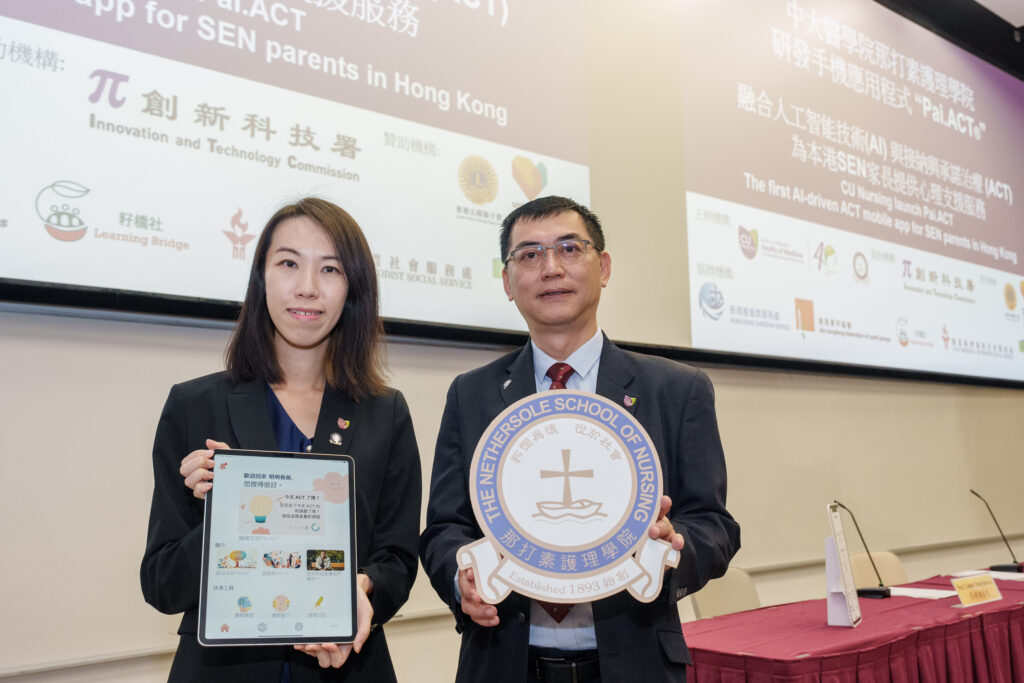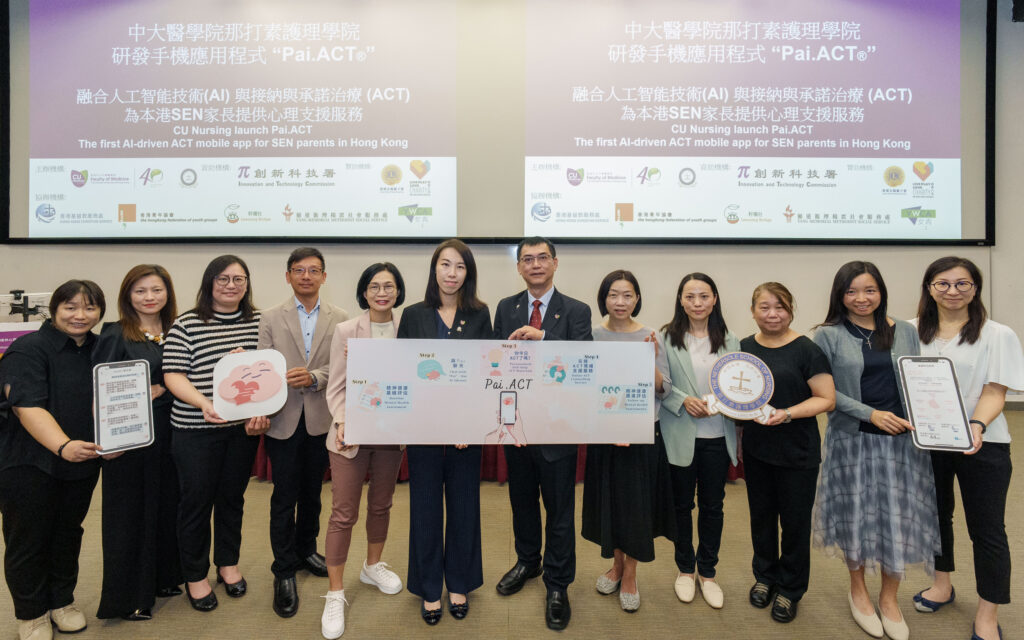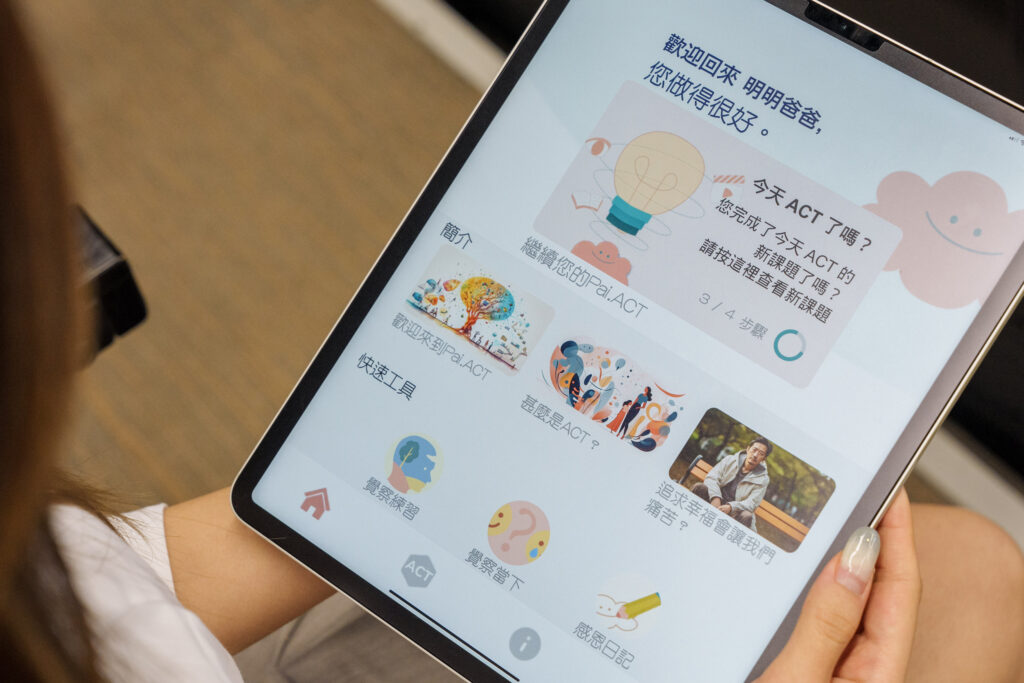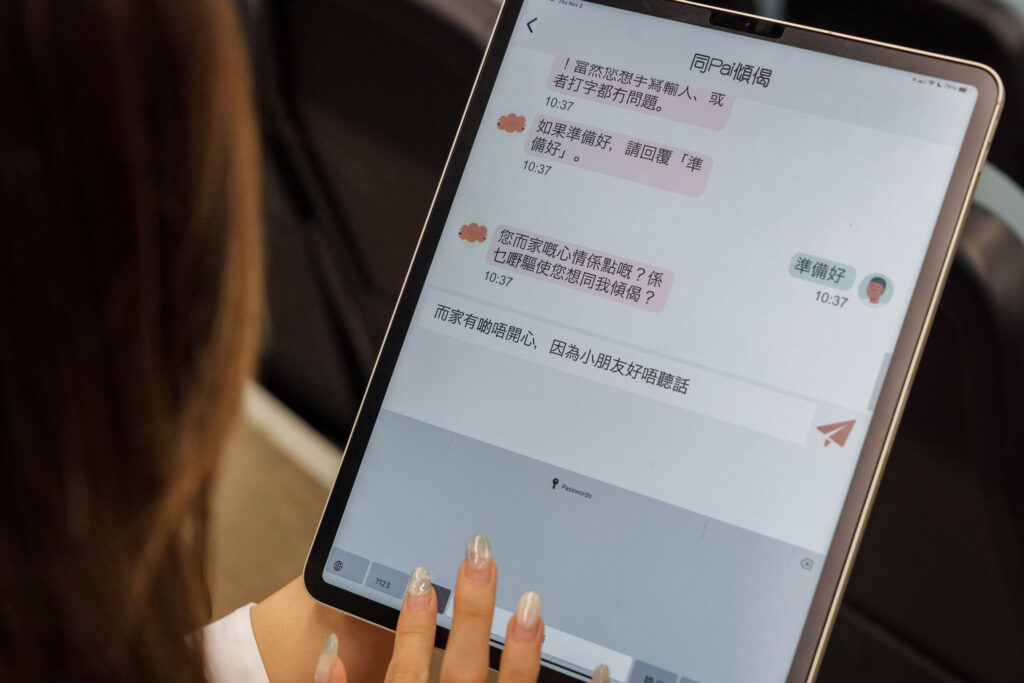CUHK
News Centre
CUHK Nursing develops mobile app “Pai.ACT”
The first AI-driven Cantonese psychological support tool for parents of SEN children in Hong Kong
Parents or caregivers of children with special education needs (SEN) have always been under tremendous pressure when caring for their children. Such parenting stress can not only impact family life and relationship but also affect their mental well-being.
The Nethersole School of Nursing at The Chinese University of Hong Kong (CUHK)’s Faculty of Medicine has developed the Pai.ACT app, an innovative psychological intervention platform designed mainly to help caregivers of SEN children in Hong Kong with their mental health. Pai.ACT is the foremost AI-driven app crafted explicitly for Cantonese-speaking parents or caregivers of SEN children. This innovative app harnesses the principles of Acceptance and Commitment Therapy (ACT), a values-driven, mindfulness-based psychotherapeutic approach.
Emotional support is essential for parents and caregivers of SEN children
With growing awareness of SEN in the society over the past decade, we are seeing a consistent increase in the number of students with SEN. Government data from the 2021/22 school year indicates that approximately 1 in 10 students in public primary and secondary schools have SEN.
Professor Chien Wai-tong, Director of The Nethersole School of Nursing at CU Medicine, remarked, “The prevailing focus of services for SEN families in Hong Kong predominantly targets recovery and rehabilitation, with minimal emphasis on the emotional well-being of parents or caregivers. Social awareness is an essential part of support for families with SEN children, and we are committed to addressing this important service gap.”
Pai.ACT: an invention that uniquely blends natural language processing technologies and validated psychotherapeutic methodologies
The research team at The Nethersole School of Nursing led by Professor Connie Chong designed the Pai.ACT programme to accurately assess the psychopathological processes of parents through interactive dialogues with AI chatbot “Pai”. The tool is a unique blend of “Natural Language Processing” machine learning model and ACT therapy.
The development of Pai involved training an AI model using a large dataset of over 10,000 Cantonese texts that were tagged specifically for ACT-based therapeutic dialogues with parents. Through a rigorous training process, Pai achieved an accuracy rate of over 80% in identifying the psychological flexibility processes of ACT in Cantonese conversations. This high level of accuracy allows Pai to mimic the empathetic, supportive conversational style that is characteristic of ACT counsellors, providing users with human-like interactions.
Users have to complete a self-reported mental health assessment that measures anxiety symptoms, depressive symptoms and parenting stress before interacting with Pai. Based on the assessment results and interactions, users receive personalised self-help materials based on ACT principles, including learning resources such as videos and audio-guided experiential practices. Users also have the option to schedule an appointment with ACT counsellors for video-conferencing sessions, where they can receive ACT services in a more personalised, interactive manner.
Professor Connie Yuen-yu Chong, Assistant Professor of The Nethersole School of Nursing at CU Medicine, explained, “Pai.ACT is more than just an advanced technological tool. It provides a highly accessible platform for SEN parents to access round-the-clock mental health support based on ACT principles. It also provides a safe space where parents can freely express their emotions, accept their thoughts without judgment, and commit to actions that align with their values. This invention has the potential to be extended to other caregivers as well, particularly those caring for individuals with chronic illnesses. People in these situations often experience significant emotional needs throughout their caregiving journey, and Pai.ACT can address these needs effectively.”
For empirical validation, the research team will aim to enlist 1,000 parents of SEN children to evaluate the app’s efficacy in the real-world, providing quantifiable data on its performance and impact. The Pai.ACT app, supported by the government’s Innovation and Technology Fund for Better Living, will officially launch in November 2023, with a US provisional patent having been filed in October.
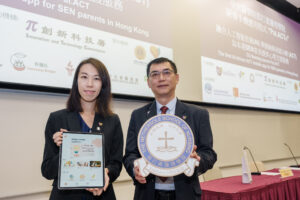
The Nethersole School of Nursing at CU Medicine has developed the Pai.ACT app, an innovative psychological intervention platform designed to help caregivers of SEN children in Hong Kong with their mental health.
Featured in the photo are (right) Professor Chien Wai-tong, Director and Professor Connie Yuen-yu Chong, Assistant Professor of The Nethersole School of Nursing at CU Medicine.
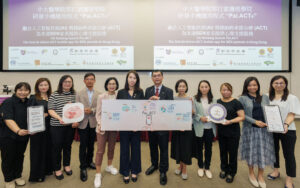
To strengthen services of mental health support for parents of SEN children, The Nethersole School of Nursing at CU Medicine joined with Hong Kong Christian Service, The Hong Kong Federation of Youth Groups, Learning Bridge, Yang Memorial Methodist Social Service, and Hong Kong Young Women's Christian Association to offer training and online sessions of Acceptance and Commitment Therapy (ACT Therapy) from 2022.

Ms Bonnie Yip, Executive Director of Learning Bridge, is a mother of child with ADHD. She says she has accumulated certain mental and emotional problems due to stress from parenting over the years. The ACT therapy training offered by CUHK helped her realise her thoughts and gain moral support from other parents who had similar experience.


